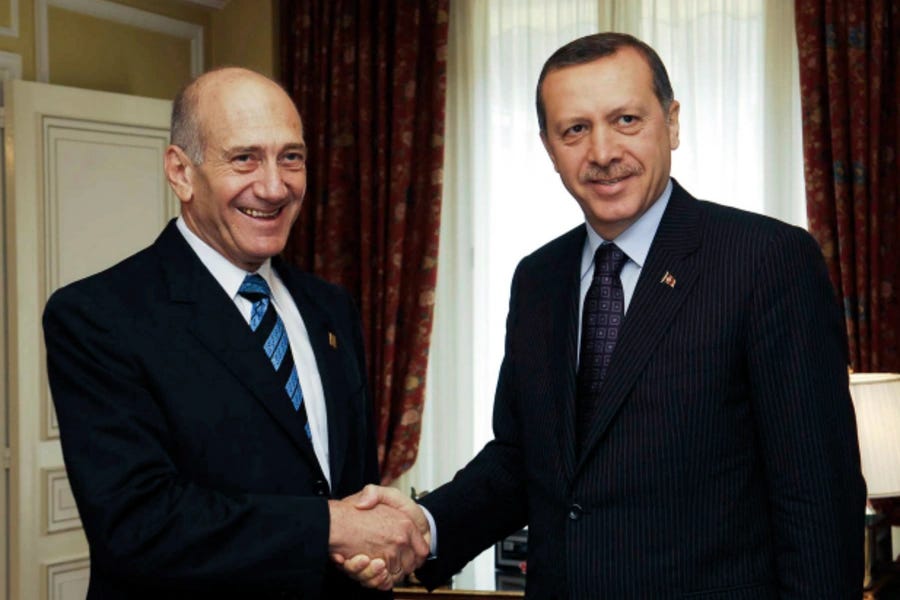Issue 84: Israel, Turkey & Syria Give Talk A Chance (Again)
In the Kabob Crescent, negotiations are an art form - but will it produce a win-win scenario?

Once upon a time in 2008, Turkish Prime Minister Recep Tayyip Erdoğan quietly pursued secret peace talks between Israel and Syria. Turkey had enjoyed a gradual warming of ties with young Syrian president Bashar al-Assad and believed that brokering a deal would contribute to regional stability.
Between May and August 2008, Turkey hosted four rounds of meetings between Israeli representatives and their Syrian counterparts in Istanbul and Ankara. The Turkish mediator shuttled back and forth between the two parties; negotiators neither met face to face nor shared the same hotel. But, as Israeli Prime Minister Ehud Olmert’s legal troubles caught up with him, negotiations stalled. Just as he lacked the political capital to reach an agreement with the Palestinian Authority that year, he also couldn’t finish the deal with Syria. This wasn’t for a lack of effort. In late December 2008, Olmert accepted an invitation from Erdoğan to visit Ankara in order to draw up a draft agreement that could advance peace talks with Syria. For over four hours, the two leaders sat in Erdoğan’s residence and poured over details with Assad over the telephone. They didn’t get a deal done, but the parties felt confident when Olmert boarded the plane back to Tel Aviv.
Days later, and after several failed attempts to renew a truce with Hamas, Israel launched Operation Cast Lead.
Israel-Turkey relations have not been the same since.
I was recently reminded of this episode in Middle Eastern diplomatic history while recording a podcast episode with Selim Koru and Nick Danforth on Israel-Turkey relations. In our conversation, we explored how the sudden collapse of the Assad regime in December 2024—triggered by Israel’s rapid campaign against Hezbollah and the advance of Turkish-backed Hayat Tahrir al-Sham (HTS) on Damascus—eliminated the geographic buffer between Israel and Turkey and laid bare their conflicting visions for Syria and, potentially, the wider region.
In recent weeks, echoes of that moment have resurfaced. Israeli and Turkish military officials have engaged in deconfliction talks—facilitated by Azerbaijan—in an effort to prevent accidental escalation in Syria. At the same time, Reuters reported that Israel has entered secret negotiations with Syria’s new president, Ahmad al-Sharaa. These talks, confirmed by Sharaa during a visit to Paris, are reportedly being mediated by the United Arab Emirates.
These developments are deeply interconnected. Assad’s fall caught nearly everyone off guard, including Israel. Now it must craft a new strategy that reconciles longstanding security imperatives with Syria’s rapidly evolving political landscape.
Strategy is the operative word. If I were to assess Israel’s approach in Syria since December 2024, I’d argue that it has essentially continued the same strategy it adopted at the outset of the civil war: protecting its borders, providing occasional humanitarian (and other) support for factions within Syria, and preventing the transfer of Iranian arms to Hezbollah. While many of these objective remains valid, the changes on the ground over the past six months demand a comprehensive reassessment. Russia’s influence in Syria is waning, and its ability to sustain its military footprint is increasingly uncertain. Iran, having invested heavily in the Assad regime and sought to establish a strategic presence in Syria, now faces major setbacks. The new Syrian leadership is opposed to continued Iranian entrenchment, which severely disrupts Hezbollah’s supply lines and imposes significant operational constraints. And the United States, which maintained a military force in Syria since the campaign against ISIS, has announced future withdrawals of its soldiers.
In short, while Israel may have preferred a status quo, the only constant in the Middle East is change. A revised strategy is urgently needed—one that not only addresses evolving threats but also embraces open channels of communication with Turkey. Ankara has supported various anti-Assad factions and has maintained a military presence in Syria since 2016. Any future regional framework will need to acknowledge and engage with this reality.
I recently had the opportunity to visit Turkey. While there, I sought to better understand the country’s political and economic climate, public sentiment toward Israel’s war, and Turkish perspectives on the region’s future. My main takeaway: although Israeli and Turkish positions on Gaza remain starkly opposed, many other differences—including those concerning Syria—are bridgeable, provided there is a genuine commitment to ongoing dialogue.
Next week, I will share my outline for how Israel and Turkey can potentially turn a corner. But for now, I’d like to share some content related to the nexus of Israel, Turkey, and Syria.
Much of the skepticism about Syria’s future is predicated on the personality and ideology of its new president, Ahmad al-Sharaa. In my opinion, the Financial Times profile on al-Sharaa is the best out there.
Nate Schenkann’s piece on Turkey’s engagement in Syria is a bit dated (it was published several months prior to Assad’s fall) but I think is still of value because of how it details Turkey’s interests in Syria and the relationship between military operations, domestic politics, and democratic resilience.
One of the more complicated elements of Israel’s approach in Syria has been its engagement with the country’s Druze population. I’m likely to address is it greater detail in the coming months, but there is a tremendous amount of misinformation about the community, its interests, and its relationship with Israel. But int he meantime, I’m sharing Ryan Biller’s piece for Newlines Magazine, which offers a fresh take on what is happening in southern Syria (with a few stories that I think are a bit sensationalized).
Thanks for taking the time to read. As always, I welcome your comments and questions.
Best,
Gabi




This really sheds light on how complex the Middle East game is. It’s wild how history keeps repeating itself, huh?